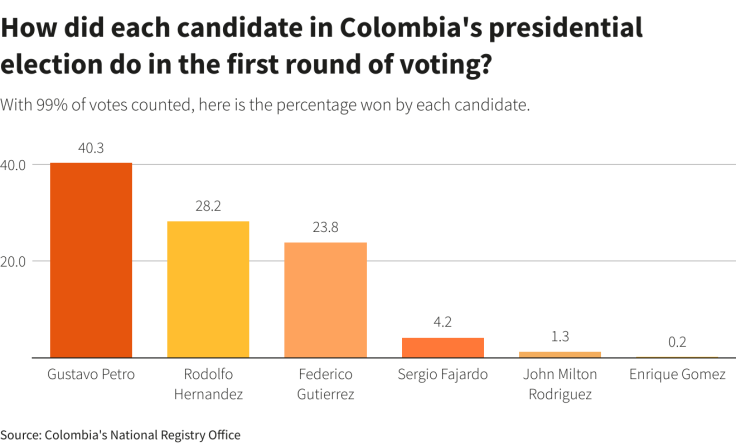Colombia Outsider Candidate Hernandez May Weaken Leftist Petro's Rebel Status
Colombian leftist Gustavo Petro leads the race for the country's presidency ahead of a second round of voting, having inspired his supporters to imagine a more equitable, greener country, they say.
But promises of radical change from the former M-19 rebel may now resonate less with those who want a break from Colombia's traditional political machinery: Petro's surprise rival in the June 19 run-off will be Rodolfo Hernandez - a septuagenarian who has run a populist campaign as an independent, anti-establishment maverick.
Petro won 40.3% of votes in Sunday's first round, while Hernandez tallied 28.2%. He was followed by centre-right Federico 'Fico' Gutierrez, who won 23.9% and had been seen as the continuity candidate widely predicted to be Petro's second-round rival.
Known for his eccentric videos on TikTok, Hernandez has promised to strengthen law and order and create jobs, though details of his plans have been scant.
Petro, the 62-year-old former mayor of capital Bogota, is making his third bid for the presidency on reforms he says will begin to correct centuries of social injustice.
"Today the murderer is in power, the thief is in power, that's why we must change who is in power if we want to be able to live in this nation, to simply live," Petro told a rally in the agricultural city of Fusagasuga earlier this month.
Petro had structured much of his rhetoric around the need for change, casting Gutierrez as representing the same political interests as unpopular current President Ivan Duque and his mentor, political heavyweight ex-President Alvaro Uribe.
"What we should fear is not changing the country," Petro said.
But the anti-establishment rhetoric of Hernandez, the former mayor of Bucaramanga, and his promise to end privileges for officials and govern frugally will scupper Petro's narrative, analysts said, especially given Gutierrez and many of his supporters will now back Hernandez.
How did each candidate in Colombia's presidential election do in the first round of voting?

"This is the scenario that Petro feared the most," said Daniela Cuellar, senior consultant at FTI Consulting in Bogota.
"Petro's rhetoric performs best when he paints himself rallying against a candidate from the elite. That dialectic oratory fizzles somewhat when countering another candidate from outside the inner circles of power who also promises change."
Petro is likely to try to emphasise that despite Hernandez's calls to end corruption, the 77-year-ol himself is under investigation for graft, said Colombia Risk Analysis founder Sergio Guzman.
The probe by the attorney general's office concerns allegations Hernandez intervened in a trash collection tender when he was mayor to benefit a company his son had lobbied for.
"It may work with centrists, but clearly their votes are minimal," said Guzman, referring to low scores in the first round for three other candidates who polled less than 6% combined. "Fico voters and Uribe supporters would vote for a rock before they vote for Petro."
"Petro has three weeks to spin his campaign narrative on its head ... he is unlikely to succeed," said Guzman.
OUT WITH THE OLD
Petro supporters of all ages told Reuters they believe he is the candidate to bring change to the Andean country, especially via his environmental policies - including a ban on new oil contracts - and his promise to offer free public university studies.
Free tuition would be life-changing, said social science student Santiago Castillo, 20, who attended the Fusagasuga rally.
"It's really tough to access education because we can't make ends meet," said Castillo, who also works as a waiter. "With him we know we won't need to kill ourselves or stop sleeping."
Olgia Depolo was waving a large Petro flag and came to the rally with her adult grandson.
"We've had the same vision for years, not four years but four decades," she said.
But Hernandez supporters said it was the civil engineer, who says he amassed a fortune of $100 million via his construction company despite humble beginnings, who best understands the change Colombians want.
"Despite his mistakes I hope he can lower corruption," said Gloria Gracia, 61, a physical education and dance teacher who voted for Hernandez told Reuters, adding she likes that he financed his campaign himself and values rural communities.
Hernandez's farmer father was held for months by the FARC guerrillas decades ago, while his daughter Juliana was kidnapped by the National Liberation Army (ELN) rebels in 2004 and is believed to have been murdered in captivity.
Like Petro, Hernandez has said he would fully implement a 2016 peace deal with the FARC rebels and seek peace talks with the ELN.
© Copyright Thomson Reuters 2024. All rights reserved.





















